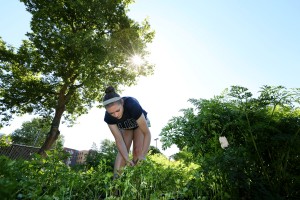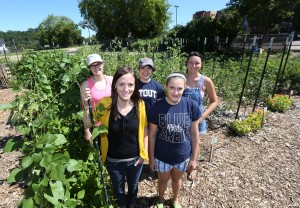
The UW-Sprout CSA Campus Garden is photographed Wednesday, July 29, 2015. Pictured is Brianna Shea, a environmental science sophomore from Hartford, Wis., harvesting parsley. (UW-Stout photo by Brett T. Roseman)
Menomonie, Wis. — On a recent summer morning, sun shining, University of Wisconsin-Stout students picked cucumbers, patty pan summer squash, dragon tongue bush beans, parsley and other items from a well-tended row garden on north campus.
After washing the vegetables and herbs in basins filled with water, three students loaded the day’s bounty into coolers, strapped the coolers onto pull-behind carriers and pedaled to south campus.
By midday, 11 UW-Stout employees — the garden’s share owners — each had a half-bushel of fresh produce in boxes to take home that night.
It was harvest day for students involved in a new, sustainable venture at UW-Stout — the UW-Sprout Campus Garden.
The university’s first retail garden has taken root this summer. Close to 40 varieties of vegetables and herbs have filled up a 3,000-square-foot plot, a university-owned former home lot on Fourth Street West, behind Red Cedar Hall.
The garden was created to teach students about sustainable food production and to enhance the campus culture regarding sustainability, ecology and healthy eating, but it’s also being run as a business.
“A lot of students want to learn how to make this into a business. They’re getting a lot of multifaceted skills — marketing, social media, public relations, budgeting. We’re showing there’s worth and financial value,” said Sarah Rykal, UW-Stout sustainability coordinator.
In fact, the garden will make a profit in its first year. Expenses are $1,350 and revenue is $2,200, the latter coming from the 11 customers who each paid $200 for a weekly share of the produce.
The garden’s customers are limited to UW-Stout employees, although a garden market stand could open in the future, Rykal said.
Future possibilities also include professors using the garden for research and working with city school students and local residents to create a more community-oriented garden.
Students enjoy experience
Katie Ankowicz, of Madison, is the garden manager and one of two students who have worked full-time this summer in the garden. She is majoring in environmental science with a concentration in plant science innovations.

Garden workers take a break. Front row from left, Sarah Rykal, sustainability coordinator, and Brianna Shea. Back row from left, Lyndsey Provos, Laura Donovan and Katie Ankowicz. (UW-Stout photo by Brett T. Roseman)
“The garden has helped me take on an adventure. I enjoy this type of learning, and I want to work in sustainable agriculture,” said Ankowicz, a senior this fall.
The garden’s other paid employee is student Brianna Shea, of Hartford. Their salaries are paid by the Sustainability Office but in the future likely will come from garden revenues.
Ankowicz did much of the garden planning, with some support from the Dunn County Master Gardeners and her father, a longtime gardener. She coordinated a donation of $200 worth of seeds from Baker Creek Heirloom Seed of Mansfield, Mo.
“It’s really exciting to see the plants grow. Zucchinis grow so fast. It’s like Christmas,” she said.
Recently, extra lettuce was delivered to the local Stepping Stones food pantry. “That made me feel really good,” Ankowicz said.
About 10 other students have volunteered, with their only pay being some of the extra produce.
One of the volunteers is Laura Donovan, an applied social science major from Platteville.
“We hope to get people reconnected to food and the environment and become more aware of their surroundings,” Donovan said. “I’m passionate about local food and organic food. It’s nice to know I’m part of something bigger and serving the community.”
University support, sustainable approach
Along with the 11 share owners, the university has supported the garden in other ways.
The Stout Student Association gave the garden $10,100 in green fees to help get it started, and about 60 environmental science students worked by hand in April to create the 28 rows and prepare the space for planting. Students majoring in construction built the shed and poured the concrete for the foundation.
The plants in the UW-Sprout Campus Garden are grown sustainably:
- No chemicals are used. Students weed by hand.
- Compost from Acoustic Café in Menomonie is picked up three times a week.
- Cowsmo of Cochrane donated a truckload of compost at the beginning of the summer.
- Mulch around the plants is free through a city program.
- Other compost material is from leftover Stoutonia newspapers.
Rykal said UW-Stout’s garden is the only CSA — community supported agriculture — garden in the UW System. CSA gardens, which typically have share owners, have become popular in recent years among people who prefer locally grown produce.
To see a UW-Stout video about the garden, go to https://youtu.be/9REg2CfEuSE.
For more information about the garden, go to www.facebook.com/uwsprout or email uwsproutgarden@uwstout.edu or the UW-Stout Sustainability Office, 715-232-5254, www.uwstout.edu/sustainability.
